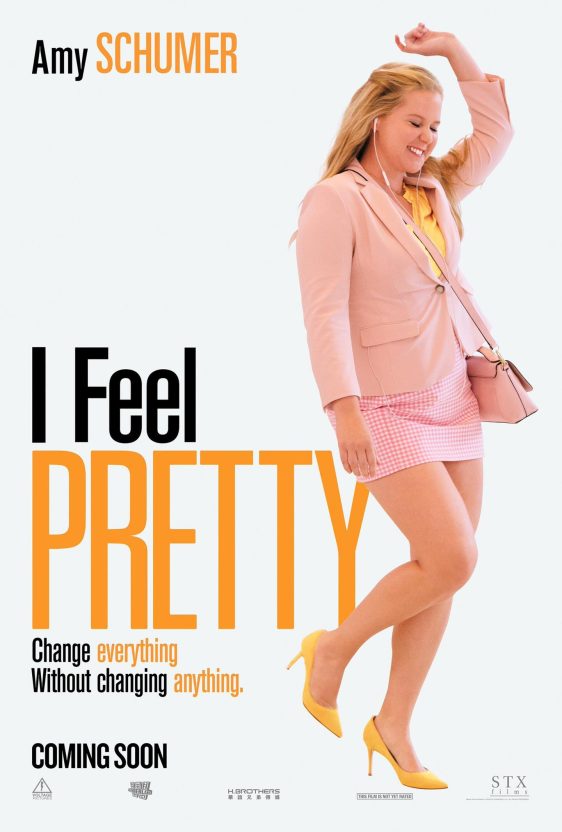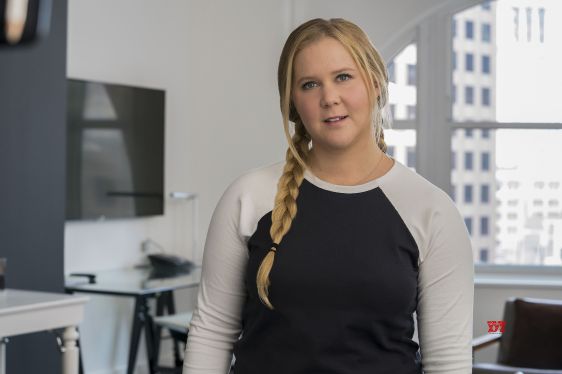I Feel Pretty earns a lot of points for good intentions. It is a fundamentally well-meaning and goodhearted film, centered on a lead character, Renee (Amy Schumer) who – through the lens of magical realism – is learning a lesson about self-acceptance and self-esteem that the world could surely use more of. It’s just a shame that it used such a banal, low-stakes filter of capitalism and high fashion to tell that story. Renee works at an haute cosmetics company, Lily LeClaire (whose retired eponymous founder is played by Lauren Hutton). LeClaire’s granddaughter Avery – played by Academy Award winner Michelle Williams (along with her My Week With Marilyn voice) – is taking the reins of the company as it makes a push to expand to the Target and Walmart crowd with some lower-cost makeup. And in comes Renee, who previously worked in a Chinatown basement as part of the company’s ramshackle two-person website team, who decides that her greatest dream is to work as a receptionist at the company’s Fifth Avenue skyscraper. I have a number of credulity problems with this setup, but let’s move on to Renee herself.
Renee is a woman who is deeply insecure about her appearance and body. This is illustrated in classic “show, don’t tell” fashion with an opening montage that starts with an awkward first-time sortie to SoulCycle, climaxes with a pants-ripping, vulva-bruising fall, and finishes with Renee standing in her underwear in front of the mirror (framed as an unblinking stare almost directly at the audience), nary a drop of makeup on her face, looking dejected and disgusted with herself. I’m coming at this film as a follow-on and attempted modernization of innumerable body-swapping and slapstick comedies of the turn of the century (everything from Shallow Hal to The Hot Chick) that frequently used or abused the bodies of women – especially women considered overweight or Hollywood-overweight – as comedy fodder. I’d call it a qualified success in that arena, but even as a straight drama about a woman struggling with her body image and self-esteem, Schumer also performs admirably in this film. As she debates with her friends Vivian (Aidy Bryant) and Jane (Busy Phillips) about the efficacy of profile details in online dating (which they’re somehow doing as a trio) as opposed to merely taking a sufficiently hot profile picture, it feels like the film is posturing, certainly, but it also feels like a genuine expression from Renee’s experience through Schumer’s sincerity. Online dating is a frustrating experience until the moment it isn’t, and it’s something women and others alike bitch to their friends about. Fair enough.
And then Renee smacks her head. Really hard, during a second fall at SoulCycle (which is getting a lot of injuries in return for its product placement buck). And suddenly, she is suffering from a traumatic delusion that she has transformed into a gorgeous, unrecognizable version of herself. To be clear, Schumer is still playing Renee at this point – there is no actual body-swap happening here. But the film essentially acts like a body-swapping movie from this point on, with Amy acting like the “hot chick” that she now sees in herself, and the world delivering some impressive (but not, like, The Secret-level) return on her confidence. She gets a new boyfriend, Ethan (Rory Scovel), and of course she gets the new job at Lily LeClaire, because she wanders into the lobby-adjacent conference room where Avery the CEO does all her most important work in full view of the public, and decides that she has to have it. To be fair, she offers a few tangible pointers on what “real women” will think of Lily LeClaire’s new product line, soon to be slumming it at the big box stores – but this is essentially a simplified version of the fictionalized Vogue from The Devil Wears Prada – literally everyone working at this place is a model, and she’s the fish-out-of-water amongst them. And on that note, let’s cut back to reality for a second.
Lily LeClaire is a ridiculous company. It is possible that between The Devil Wears Prada and certain, other family-owned real-world companies headquartered on Fifth Avenue (and/or Pennsylvania Avenue), I’m simply unprepared to believe that this collection of Manhattan elitists perched amid the stacks of pane glass and oozing, gaudy pastels could be led by anyone other than a high-functioning sociopath. This is high fashion and high finance. These people have investors to answer to, marketing teams and focus groups that don’t bend to personal whims or hunches, and even if they didn’t, these people grew up among New York’s pampered elite, and they aren’t “just like us”. And for a movie to not only breathlessly argue that the opposite is true, but also stake its entire emotional climax on it, was such a severe leap from reality that I almost dismissed the movie for it. There’s one fictional person that ultimately prevented me from doing so, and that was Tony Stark. Because if I can accept a weapons’ manufacturer CEO going on a personal journey that ended with him promising not to build weapons anymore – and in the process, become a superhero – I suppose I can accept a woman going on a journey of self-acceptance that has the minor hiccup of briefly derailing a product launch. They both exist in the same world of magical realism and wish fulfillment (in one instance, Black Widow literally resets Hawkeye by smacking him in the head), and if nothing else, the home-game version of this journey is a bit more doable than the superhero stuff. You can’t be like Iron Man, but you can certainly feel a bit better about yourself. And that’s enough complaining. In the end, the logic centers of my brain quieted to a dull roar, and I felt every note of tension as Renee persisted in her delusional hotness, with the audience faintly dreading the painful moment when the spell must break (or when someone would get Renee some medical attention, because seriously, her condition is literally a sign of dementia or traumatic brain injury okay shut up now Glenn). Because as long as she only likes her own appearance because she believes it’s been magically altered (to a standard of beauty that is equally arbitrary, cruel, and unattainable), then she doesn’t really like herself, does she? The film expends some clever dialogue in order to maximally delay this moment (including one particularly poignant scene with Boyfriend Ethan), but fundamentally, we need to see the other shoe drop. The movie doesn’t work without it.
And we do. I don’t mind spoiling that, because honestly, if we didn’t, then – like Shallow Hal, which ends with Jack Black pretending that he finds a literally inhuman-looking Gwyneth Paltrow in a terribly-rendered fatsuit attractive – I Feel Pretty would be a profoundly cruel and cynical exercise. For the audience, for Renee, and for the woman at SoulCycle to whom she repeatedly compares herself (real-life model Emily Ratajkowski), who has just as much right to feel dejected, unattractive, and unwanted as anyone else. For all of its flaws and oddities, this movie fundamentally understands the point it’s trying to make (even if the trailer made it look like the just the sort of material that it was trying to transcend). It ends with Schumer standing up and making a TED-talk (or Kyle from South Park)-style speech explaining what she learned today. And what she learned is, “You know what? We’re all okay.” She makes nice with her friends, she sells some cheap cosmetics, and we all go home feeling a bit nicer. The execution is a bit ridiculous, but the message is quite alright.
FilmWonk rating: 6 out of 10


